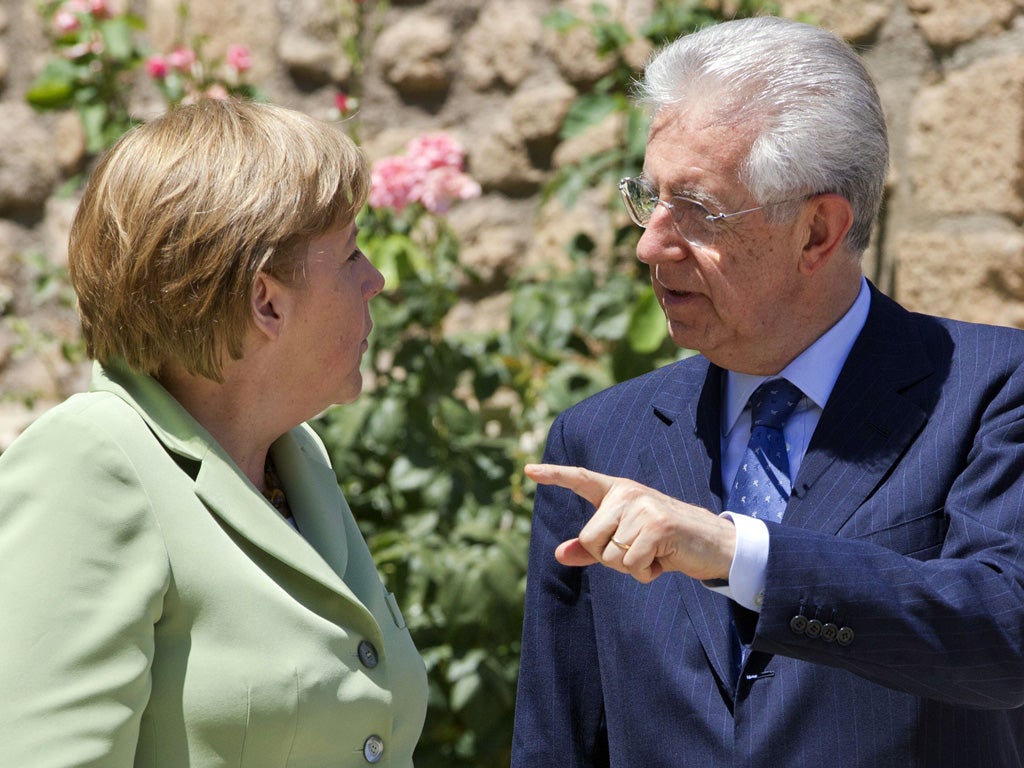Eurozone's big four put hopes in €130bn growth package
Agreement is a triumph for François Hollande who pledged to shift emphasis from austerity

The eurozone's four most important leaders yesterday announced a €130bn growth package designed to pull the single currency out of its downward economic spiral.
The French President, François Hollande, the German Chancellor, Angela Merkel, the Spanish Prime Minister, Mariano Rajoy and the Italian Prime Minister, Mario Monti, promised the funds – equivalent to 1 per cent of the European Union's GDP – at a joint summit in Rome.
The agreement is an achievement for Mr Hollande who was elected on a promise to shift the focus of the eurozone's crisis-fighting measures from budget cuts to growth stimulus. "I absolutely agree with what everyone else here has said – to devote 1 per cent of the GDP of the European area to growth, to efficiency and to investment," said Ms Merkel at a joint press conference yesterday.
The package is expected to be made up of accelerated spending of funds already in the European Union's budget, as well as an increase in lending by the European Investment Bank. The Rome summit's host, Mario Monti, stressed that severe deficit-reduction policies across Greece, Ireland, Portugal, Spain and Italy needed to be offset by measures to boost growth if they were to succeed. "Growth can only have solid roots if there is fiscal discipline, but fiscal discipline can be maintained only if there is growth and job creation," he said.
Spain and Italy have seen their borrowing costs rise to dangerous levels in recent weeks as their economies have sunk into recession, and investor alarm has grown that they could require a full bailout. All of Europe's leaders will gather for a summit in Brussels next Thursday, where they are expected to announce plans for a pan-European banking union in order to reassure depositors their savings will not be devalued.
The IMF put pressure on Europe's leaders earlier this week to go much further, urging the European Central Bank to recommence its sovereign-bond buying programme and for the eurozone to mutualise its debt. Those measures will be on the table in Brussels, but they are still being fiercely resisted by Ms Merkel. Mr Monti said Europe's leaders must use the Brussels summit to show "that the euro is here to stay".
Mr Hollande piled more pressure on Ms Merkel on the subject of debt mutualisation at yesterday's press conference. "I consider euro bonds to be an option ... but not in 10 years," he said, referring to German arguments that common debt issuance can only follow closer fiscal convergence between member states.
Spain and Italy have also argued that European bailout funds should be used to buy Spanish and Italian debt directly on the secondary markets in order to reduce their borrowing costs. Ms Merkel has indicated that she might approve of this. Next week's summit will also discuss how to deal with Greece's request to be given more time to implement austerity measures.
Separately, Germany yesterday seemed to give up on plans to impose a European Union-wide financial transaction tax (FTT). At a meeting of European finance ministers in Luxembourg, the German representative, Wolfgang Schäuble, accepted there was no agreement across the 27 nations to impose the levy. However, he said that efforts would continue to impose the FTT among willing states. "My impression is that a number of member states strongly support the proposal of an FTT," said Mr Schäuble. "We should give it a try."
Subscribe to Independent Premium to bookmark this article
Want to bookmark your favourite articles and stories to read or reference later? Start your Independent Premium subscription today.

Join our commenting forum
Join thought-provoking conversations, follow other Independent readers and see their replies